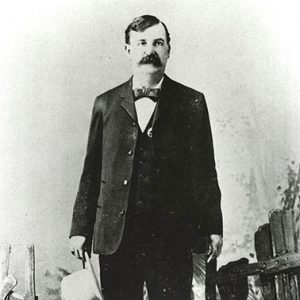calsfoundation@cals.org
Henry Andrew "Heck" Thomas (1850–1912)
Henry Andrew “Heck” Thomas became one of the best-known officers of the law in Arkansas and Indian Territory (later Oklahoma). His reputation as a fearless crime fighter stemmed from a determination to bring felons to justice and from the notorious characters he encountered. Tall and lean, with dark eyes and a mustache, Thomas was the image of the frontier lawman, usually attired in knee-high boots, corduroy trousers, and a flannel shirt. Thomas, and others like him, helped combat frontier criminals in order to make the region safe for settlers.
Heck Thomas was born on January 6, 1850, in Oxford, Georgia, the last child of twelve of Martha Ann Fullwood Bedell Thomas and Lovick Pierce Thomas. He acquired the nickname “Heck” from schoolmates. In 1862, he became a messenger in his father’s unit of the Thirty-fifth Regiment, Georgia Volunteers (CS). Thomas delivered dispatches at the Second Battle of Bull Run. After the war, his father became city marshal of Atlanta, Georgia, and Thomas gained an appointment as a policeman. During the Brush Arbor Race Riot of 1868, Thomas suffered two bullet wounds, and, in another incident, an assailant cut his face, permanently scarring him. In 1871, Thomas married Isabelle Gray, daughter of a minister from Oxford. They had five children—three sons and two daughters.
Thomas decided to join his cousin in Texas, and the family moved to Dallas, where, by 1878, his cousin had helped him get a job with the Texas Express Company as a guard in express cars of the Houston and Texas Central Railroad. In March 1878, the notorious bandit Sam Bass robbed the train. Thomas gave Bass fake money and received a $200 award for his resourcefulness. In 1885, the express company went out of business, and Thomas became a private detective. In September, he helped U.S. Deputy Marshal Jim Taylor find Pink and Jim Lee, murderers and cattle rustlers. The lawmen killed the brothers, and Thomas shared a $6,000 reward with Taylor. This incident made Thomas famous as a diligent crime fighter. However, his wife disliked Texas. As a result, Thomas decided to seek an appointment as a U.S. deputy marshal and took his family to Fort Smith (Sebastian County).
In 1886, Thomas received a commission as deputy from U.S. Deputy Marshal Thomas Boles to police Indian Territory under the jurisdiction of the federal district court at Fort Smith. The position provided a steady income, but the job came with inherent dangers, as criminals in Indian Territory frequently killed or injured deputies. Unintimadated, Thomas rounded up thieves, whiskey peddlers, and accused murderers. In 1887, he investigated the heinous killing of two newlyweds in the Choctaw Nation. He apprehended the culprits, enhancing his reputation as a federal officer.
Later that year, Thomas moved his family to Whitebead Hill near Pauls Valley, Chickasaw Nation, because tribal leaders had requested a resident deputy marshal. This move put a strain on his marriage, and Isabelle returned to Georgia with the children. In 1888, the couple divorced.
On November 21, 1887, Thomas took forty-one prisoners to Fort Smith, reportedly the largest single group of felons ever delivered to the court. The following summer, Thomas was wounded by moonshiners. While recuperating at Tulsa in Indian Territory, Thomas met Matie Mowbray, the daughter of a Methodist minister. They married four years later and raised two daughters.
Changes to federal court jurisdictions expanded Thomas’s role as a law enforcement officer. Creation of the federal district court at Muskogee in Indian Territory and expansion of the U.S. District Court at Paris, Texas, brought Thomas commissions from those jurisdictions as well as Fort Smith. In April 1889, officials sent Thomas and other deputies to keep order during the opening of the Oklahoma District. Thomas also continued to pursue law breakers in Indian Territory, delivering a final cache of criminals to Fort Smith in July 1890. By this time, Thomas had become a recognized public figure for his role as a peace officer.
The rest of Thomas’s career was in Oklahoma Territory. He received a commission from the U.S. Marshal at Guthrie, Oklahoma Territory. Between the spring of 1894 and the summer of 1896, Thomas, Chris Madsen, and William M. “Bill” Tilghman—known as the “Three Guardsmen”—concentrated on successfully exterminating the Bill Doolin Gang. In 1901, the U.S. Marshal Service dispatched Thomas to Lawton to assist with the land opening there. The next year, voters elected him the first chief of police of that town, a position he held for seven years. He retained his marshal’s commission, and his family resided in Lawton.
On August 15, 1912, Thomas died, apparently of heart failure complicated by Bright’s disease. He is buried in Highland Cemetery in Lawton. In the early 1970s, NBC broadcast the movie The Century Turns, and the series Hec Ramsey, both loosely based on Thomas’s tenure as a Lawton police officer.
For additional information:
“Heck Thomas.” Vertical File, Archives and Research Division. Oklahoma Historical Society, Oklahoma City, Oklahoma.
Shirley, Glen. Heck Thomas: Frontier Marshal. Philadelphia, PA: Clinton Company, 1962.
Bill Corbett
Northeastern State University
 Post-Reconstruction through the Gilded Age, 1875 through 1900
Post-Reconstruction through the Gilded Age, 1875 through 1900 "Heck" Thomas
"Heck" Thomas 



Comments
No comments on this entry yet.